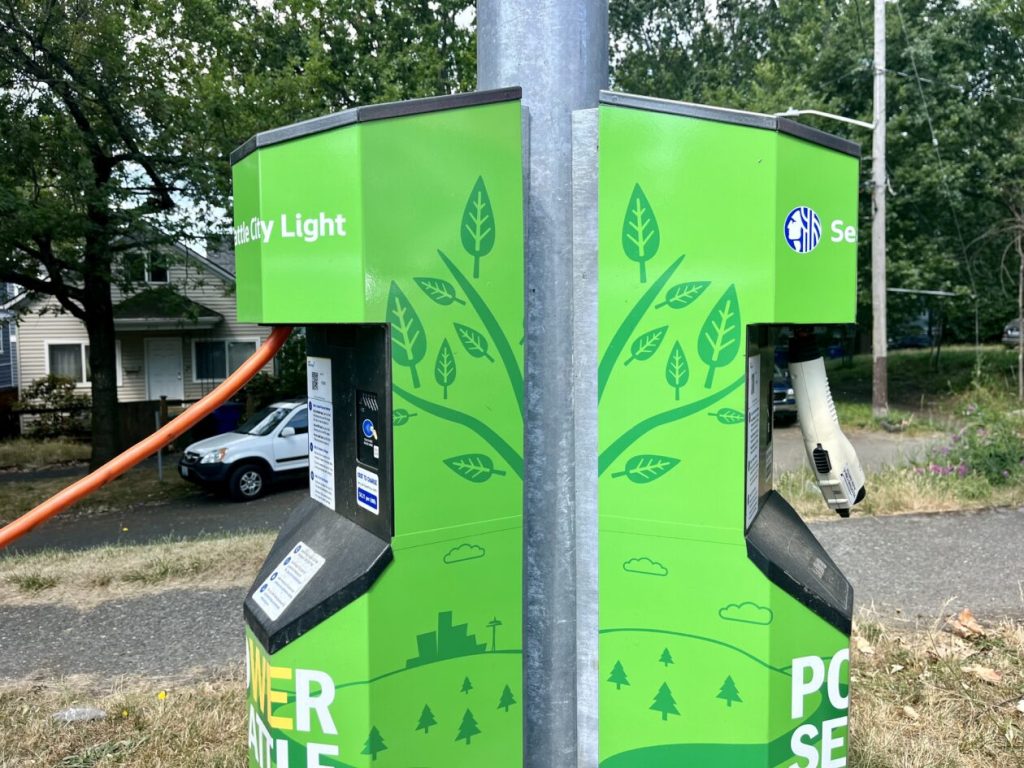Summarize this content to 2000 words in 6 paragraphs
Seattle City Light curbside retractable EV chargers. Shown in use on the left and ready for use on the right. (GeekWire Photo / Gillian Dohrn)
At a recent climate event, representatives from Seattle City Light proudly displayed an electric vehicle charger with a cable that retracts neatly into the unit when not in use. It’s a clever solution for roadside charging. It keeps walkways clear and perhaps even more importantly, it safeguards the cables from thieves searching for the copper contained in EV charging cables.
But there’s one problem with the fix. Only the slower-charging cables can be coiled and retracted. The technology doesn’t work for the stiffer cables at fast charging stations that contain more copper and are being stolen citywide, leaving EV drivers frustrated and anxious.
In Seattle and elsewhere, public charging stations are cropping up to meet growing demand as EV adoption increases. But the fast charging stations are a hot target for criminals, netting thieves roughly $20 per cable at a scrap yard. Efforts so far to prevent the thefts aren’t working. Commercial companies, including Electrify America and EvGo, report more than 100 cables that have been stolen in Seattle in the past 12 months, and the city-owned stations are likewise being hit hard.
At a booth at the Bloomberg Green Festival in Seattle this summer, City Light manager Uzma Siddiqi explained the issues with different chargers and the urgent need for a theft-proof design for fast chargers, which can restore battery levels to 80% in 30 minutes. Slower chargers take hours.
“If you know of any solutions, please send them our way,” Siddiqi said.
Half of Seattle’s car owners live in homes that do not have a driveway or a garage in which they could install an at-home charger, so last year, the city launched a public charger pilot project to help serve those drivers. The pilot program is deploying Level 2 chargers, which are faster than a typical home charger but not as speedy as the Level 3 DC fast chargers.
The utility received 1,800 location requests for 31 of the retractable intermediate chargers. The program has been a hit, officials said. The most popular site is a neighborhood with lots of houseboats, where the unit is averaging three cars per day.
This Electrify America fast charging station in South Seattle has been targeted repeatedly. The cable in the background has been cut. These cables are too stiff and thick to coil up when they’re not in use. (GeekWire Photo / Gillian Dohrn)
The fast chargers, however, are another story.
City Light has 21 fast charging stations in Seattle. Since March 2022, thieves have taken more than 80 cables. With two chargers at each station, that means every cable has been stolen twice, on average.
Trying to address the problem, the utility is upgrading some of its older fast-charging sites with a new model in which 40% of the cable is encased in metal, shielding it from bolt cutters and other instruments of theft.
The hope is the shielding makes the cables less appealing to thieves, said Jacob Orenberg, who coordinates capital projects for City Light. But he doesn’t expect it to resolve the problem because the bulk of the cable is still exposed.
In the meantime, the city is replacing the cables as fast as possible. But the repairs cost $2,000 or more per charger, and it takes a few days to a week to schedule a repair technician and up to six months to get a replacement cable.
The utility plans to accept more requests for the installation of additional curbside chargers. For now, it will use the retractable model but may switch to the bring-your-own cable model popular in Europe in the future.
Cable theft has united local charger providers, who are working together on solutions. City Light said it is participating in an informal committee and considering hiring a third party security consultant. Orenberg said tougher penalties for thieves might help, citing legal efforts to curb catalytic converter theft in Washington as a model.
For now, the benefits for the criminals outweigh the costs.
“It’s going to continue that way,” said Orenberg, “until something changes.”
Editor’s note: The story has been updated to clarify that the pilot program is installing Level 2 devices that charge at an intermediate speed compared to Level 1 home chargers and Level 3 DC fast chargers.
RELATED: Seattle-area EV drivers left searching for fast chargers due to ‘epidemic’ of cable theft


